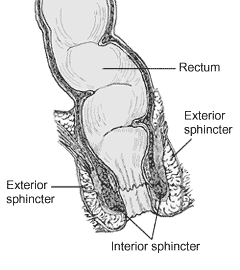 Image via Wikipedia
Image via Wikipedia
1) Home treatment for hemorrhoids which will be focusing on establishing healthy bowel habits, may help in keeping your hemorrhoids from worsening.
2) Be aware that drugs such as aspirin and ibuprofen, can cause hemorrhoids to bleed more. If you need to use a nonprescription pain reliever, choose one that is not an NSAID, such as Tylenol.
The following suggestions can help you to keep your hemorrhoids from getting worse or to relieve your symptoms.
- Blot the anal area carefully and gently with soft, wet toilet paper or toilet paper moisturised with a cleansing agent such as Balneol after having your bowel movement. Alternatively, using baby wipes or other premoistened towels can also be useful for this purpose.
- It is best to avoid any rubbing of the anal area as this just agitates the area more. Instead, you can either rinse off in the shower or on a bidet instead of wiping yourself with toilet paper. After rinsing, gently pat the anal area dry with a soft, absorbent towel or cloth.
- It is best to Use soaps that contain no perfumes or dyes so as not to irritate the sore area.
3) Relieve pain and itching
- The pain and itching can be relieved by applying ice several times daily for about 10 minutes at a time. This should then be followed by placing a warm compress on the anal area for another 10 to 20 minutes.
- Take a sitz bath. Fill your bathtub with just enough warm water to cover the anal area. Do this several times a day, especially after you have had a bowel movement. Soak for about 15 minutes at a time. Be careful! If the water is too warm, it could burn you.
Use nonprescription medicines as recommended by your health professional or pharmacist. See the Medications section of this topic for information on nonprescription ointments, creams, and suppositories.
Other comfort measures
- You may need a day or more of bed rest to take pressure off inflamed, irritated veins. If you are 3 to 6 months pregnant, you may find it helpful to lie on your side. If you are not pregnant, sleeping on your stomach with a pillow under your hips will help decrease swelling of hemorrhoids.
- Try not to sit or stand for a long time when hemorrhoids are irritated. If you must sit for a long time, sit on a pillow. Avoid lifting heavy objects.
- Wear cotton underwear to prevent moisture buildup, which can irritate hemorrhoids. Wear loose clothing to allow freedom of movement and to reduce pressure on the anal area.
- Do not use a ring or "doughnut" cushion. It will just restrict the blood flow and worsen your symptoms.
![Reblog this post [with Zemanta]](http://img.zemanta.com/reblog_e.png?x-id=cb4decae-7363-4aab-9837-e630aa61ccb2)

![Reblog this post [with Zemanta]](http://img.zemanta.com/reblog_e.png?x-id=97b26ef3-8e4d-4818-a0ee-66a25f0f0476)

![Reblog this post [with Zemanta]](http://img.zemanta.com/reblog_e.png?x-id=48d702eb-0321-45ca-ae4f-12b9f5921b79)